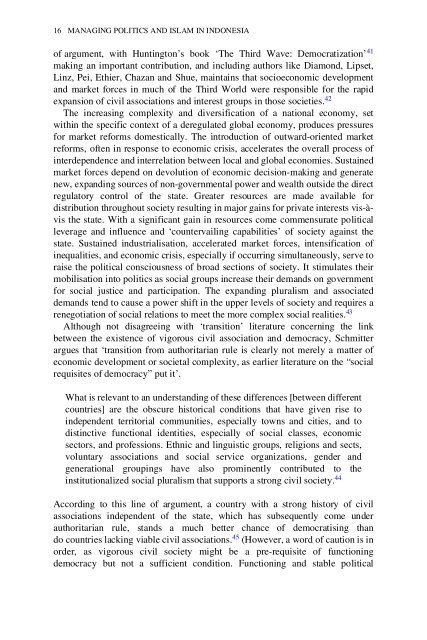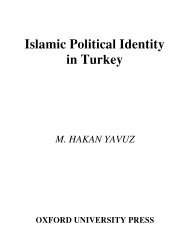You also want an ePaper? Increase the reach of your titles
YUMPU automatically turns print PDFs into web optimized ePapers that Google loves.
16 MANAGING POLITICS AND ISLAM IN INDONESIAof argument, with Hunt<strong>in</strong>gton’s book ‘The Third Wave: Democratization’ 41mak<strong>in</strong>g an important contribution, <strong>and</strong> <strong>in</strong>clud<strong>in</strong>g authors like Diamond, Lipset,L<strong>in</strong>z, Pei, Ethier, Chazan <strong>and</strong> Shue, ma<strong>in</strong>ta<strong>in</strong>s that socioeconomic development<strong>and</strong> market forces <strong>in</strong> much of the Third World were responsible for the rapidexpansion of civil associations <strong>and</strong> <strong>in</strong>terest groups <strong>in</strong> those societies. 42The <strong>in</strong>creas<strong>in</strong>g complexity <strong>and</strong> diversification of a national economy, setwith<strong>in</strong> the specific context of a deregulated global economy, produces pressuresfor market reforms domestically. The <strong>in</strong>troduction of outward-oriented marketreforms, often <strong>in</strong> response to economic crisis, accelerates the overall process of<strong>in</strong>terdependence <strong>and</strong> <strong>in</strong>terrelation between local <strong>and</strong> global economies. Susta<strong>in</strong>edmarket forces depend on devolution of economic decision-mak<strong>in</strong>g <strong>and</strong> generatenew, exp<strong>and</strong><strong>in</strong>g sources of non-governmental power <strong>and</strong> wealth outside the directregulatory control of the state. Greater resources are made available fordistribution throughout society result<strong>in</strong>g <strong>in</strong> major ga<strong>in</strong>s for private <strong>in</strong>terests vis-àvisthe state. With a significant ga<strong>in</strong> <strong>in</strong> resources come commensurate politicalleverage <strong>and</strong> <strong>in</strong>fluence <strong>and</strong> ‘countervail<strong>in</strong>g capabilities’ of society aga<strong>in</strong>st thestate. Susta<strong>in</strong>ed <strong>in</strong>dustrialisation, accelerated market forces, <strong>in</strong>tensification of<strong>in</strong>equalities, <strong>and</strong> economic crisis, especially if occurr<strong>in</strong>g simultaneously, serve toraise the political consciousness of broad sections of society. It stimulates theirmobilisation <strong>in</strong>to politics as social groups <strong>in</strong>crease their dem<strong>and</strong>s on governmentfor social justice <strong>and</strong> participation. The exp<strong>and</strong><strong>in</strong>g pluralism <strong>and</strong> associateddem<strong>and</strong>s tend to cause a power shift <strong>in</strong> the upper levels of society <strong>and</strong> requires arenegotiation of social relations to meet the more complex social realities. 43Although not disagree<strong>in</strong>g with ‘transition’ literature concern<strong>in</strong>g the l<strong>in</strong>kbetween the existence of vigorous civil association <strong>and</strong> democracy, Schmitterargues that ‘transition from authoritarian rule is clearly not merely a matter ofeconomic development or societal complexity, as earlier literature on the “socialrequisites of democracy” put it’.What is relevant to an underst<strong>and</strong><strong>in</strong>g of these differences [between differentcountries] are the obscure historical conditions that have given rise to<strong>in</strong>dependent territorial communities, especially towns <strong>and</strong> cities, <strong>and</strong> todist<strong>in</strong>ctive functional identities, especially of social classes, economicsectors, <strong>and</strong> professions. Ethnic <strong>and</strong> l<strong>in</strong>guistic groups, religions <strong>and</strong> sects,voluntary associations <strong>and</strong> social service organizations, gender <strong>and</strong>generational group<strong>in</strong>gs have also prom<strong>in</strong>ently contributed to the<strong>in</strong>stitutionalized social pluralism that supports a strong civil society. 44Accord<strong>in</strong>g to this l<strong>in</strong>e of argument, a country with a strong history of civilassociations <strong>in</strong>dependent of the state, which has subsequently come underauthoritarian rule, st<strong>and</strong>s a much better chance of democratis<strong>in</strong>g th<strong>and</strong>o countries lack<strong>in</strong>g viable civil associations. 45 (However, a word of caution is <strong>in</strong>order, as vigorous civil society might be a pre-requisite of function<strong>in</strong>gdemocracy but not a sufficient condition. Function<strong>in</strong>g <strong>and</strong> stable political




